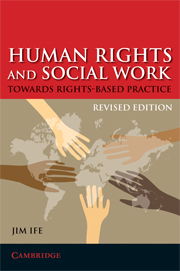Book contents
- Frontmatter
- Contents
- About the author
- Acknowledgments
- Introduction
- 1 Human Rights in a Globalised World
- 2 Human Rights: Beyond Traditional Formulations
- 3 Public and Private Human Rights
- 4 Culture and Human Rights
- 5 Human Rights and Human Needs
- 6 Human Rights and Obligations
- 7 Ethics and Human Rights
- 8 Participation in the Human Rights Discourse
- 9 Constructing Human Rights for Social Work Practice
- 10 Achieving Human Rights through Social Work Practice
- 11 Respecting Human Rights in Social Work Practice
- 12 Conclusion: Prospects for Human Rights Practice
- Appendix I The Universal Declaration of Human Rights
- Appendix II Other Human Rights Declarations, Treaties and Conventions
- References
- Index
2 - Human Rights: Beyond Traditional Formulations
- Frontmatter
- Contents
- About the author
- Acknowledgments
- Introduction
- 1 Human Rights in a Globalised World
- 2 Human Rights: Beyond Traditional Formulations
- 3 Public and Private Human Rights
- 4 Culture and Human Rights
- 5 Human Rights and Human Needs
- 6 Human Rights and Obligations
- 7 Ethics and Human Rights
- 8 Participation in the Human Rights Discourse
- 9 Constructing Human Rights for Social Work Practice
- 10 Achieving Human Rights through Social Work Practice
- 11 Respecting Human Rights in Social Work Practice
- 12 Conclusion: Prospects for Human Rights Practice
- Appendix I The Universal Declaration of Human Rights
- Appendix II Other Human Rights Declarations, Treaties and Conventions
- References
- Index
Summary
The academic literature on human rights has been dominated by three disciplines: law, philosophy and politics. Although social workers have for a long time liked to talk about rights (Centre for Human Rights 1994; Tan & Envall 2000), especially welfare rights, rights-based practice, and the rights of particular disadvantaged groups, a thorough analysis of human rights and their implications has not been prominent in the social work literature, and lawyers, political scientists and philosophers have dominated the discourse. In terms of human rights practice – the theme of this book – the field has been dominated by lawyers, who are widely regarded as the main human rights professionals, though there is now the beginnings of a social work literature on human rights (Solas 2000; Reichert 2003, 2007). Most edited collections of articles on human rights, and journals dedicated to human rights, are written and edited by lawyers, and the law is commonly seen as the primary mechanism for the safeguarding of human rights and the prevention of human rights abuses (Beetham 1999; Douzinas 2000). Emphasis has been on legislation and on human rights treaties and conventions, and much of the literature is concerned with their analysis and implementation (Mahoney & Mahoney 1993). Many countries have human rights commissions, whose membership is dominated by people with legal training, and which operate in a legal or quasi-legal way, for example by hearing complaints and making judgments which have legal force.
- Type
- Chapter
- Information
- Human Rights and Social WorkTowards Rights-Based Practice, pp. 29 - 51Publisher: Cambridge University PressPrint publication year: 2008



